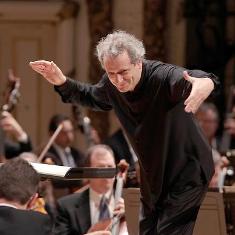
Langrée and CSO Climax "One City, One Symphony" Brilliantly
Vive Louis XIII. I.e., Louis Langrée, music director-designate of the
Cincinnati Symphony Orchestra.

Langrée, who officially assumes the post in September 2013, led the CSO and the May Festival Chorus in an extraordinary performance of Beethoven’s Ninth Symphony Thursday night at Music Hall.
It was the culmination of “One City, One Symphony,” a community engagement project begun in October by the CSO to welcome its thirteenth music director. There have been Beethoven’s Ninth “listening parties,” special materials created by local libraries and broadcasts by WGUC 90.9 FM of different recordings of the work -- all in anticipation of this week’s concerts.
The crescendo of activity reached a magnificent climax Thursday. The cheers that went up at the conclusion of the concert are still echoing through the hall, and are due to swell even higher when the concert repeats at 8 p.m. Saturday and 2 p.m. Sunday at Music Hall. There will be reverberations out in the community, too, with live transmissions scheduled for several locations in the city (details at http://cincinnatisymphony.org/Content.php?id=29)
French-born Langrée, 51, led a performance to both thrill first-time listeners and astonish those with long exposure to the work. All of the peaks were there and all of the heart-squeezing moments, clad in a wide-ranging palette of orchestral and vocal color. There was an over-arching shape to it, something that the listener might feel without being consciously aware of it. But when the Symphony reached its mighty conclusion, it not only felt right, it felt transformative.
The Symphony was preceded by Arnold Schoenberg’s “A
Survivor from Warsaw,” a seven-minute work for narrator, orchestra and men's
chorus inspired by the recollection of a true-life survivor of the Warsaw
ghetto during World War II. Narrated by
Brad Jungwirth, it was integral to the concert as a whole, both musically and dramatically. (See former CSO music director Michael Gielen's program note on the work at http://www.musicincincinnati.com/site/commentary/Michael_Gielen_Musical_Visionary_for_Cincinnati.html)
The horror of the text – about a Gestapo officer who rounds up a group of Jews in the sewer in Warsaw for transfer to Auschwitz – was captured perfectly in Schoenberg’s angular 12-tone writing, with its searing trumpet calls. Likewise, the men of the Chorus conveyed its message of resistance and hope with their full-voiced singing of the Hebrew prayer “Sh’ma Yisraeil.” Jungwirth’s narration, in mixed, speech-song -- English for the Survivor, German for the Nazi officer -- was riveting.
Following the sudden conclusion of the Schoenberg, Langrée led softly into the mysterious opening of the Beethoven.
Lines were beautifully drawn in the first movement, a kind of stage-setting for the drama of the work. The CSO played their hearts out for him in a true collaboration of musicianship and spirit. (Langrée lets them play and they let him lead. It's as simple -- and as complex -- as that.) The Scherzo featured exceptional playing by the CSO winds and brasses (kudos to principal hornist Elizabeth Freimuth). Timpanist Patrick Schleker was compelling throughout the evening, with his precise, attacks and tonal brilliance.
The Adagio was a stream of wordless song, the strings
producing a genuinely sweet, touching sound in preparation for the great
finale, with its complex buildup to the “Ode to Joy" conclusion.
Langrée shaped the
crescendos in the finale, as well as its transitions and reflective moments, with great skill and sensitivity. The shiver factor has rarely been so potent in climactic moments (nor has the opening of the "Turkish" variation been so soft and precise). The vocal soloists were a peerless lot -- soprano Twyla
Robinson, mezzo-soprano Kelley O’Connor, tenor Dimitri Pittas and bass Morris
Robinson -- who put beauty and deep meaning into Schiller’s
verses celebrating brotherhood and
peace. The 130-voice Chorus (directed by Robert Porco) was the source of much of the shiver effect, singing out into every crevice of the hall and giving the work its universality and unique musical identity.
The ending was rapturous and drew a response to match from the crowd (refreshingly full for a weekday concert). Don’t miss this one. Tickets begin at $10, available at www.cincinnatisymphony.org